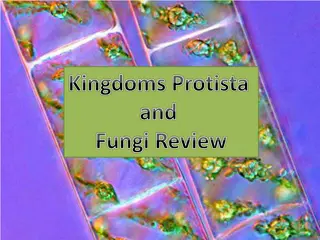Exploring the Six Kingdoms of Life
Delve into the fascinating world of the six kingdoms – Archaea, Eubacteria, Protista, Fungi, Plantae, and Animalia. Discover their unique characteristics, reproduction methods, cell types, food sources, and example organisms. From extremophiles in volcanic vents to ancient trees that live for cent
1 views • 9 slides
Five Kingdom Classification in Biology: An Overview
The five kingdom system of classification, proposed by R.H. Whittaker in 1969, categorizes living organisms into Monera, Protista, Fungi, Plantae, and Animalia based on their characteristics. Each kingdom represents a distinct group of organisms, aiding in a more scientific and natural classificatio
2 views • 7 slides
Exploring the World of Protists: A Kingdom of Diversity
Protists are eukaryotes that cannot be classified as plants, animals, or fungi. They thrive in moist environments and showcase a remarkable diversity within the Kingdom Protista. From animal-like protozoa to plant-like autotrophs and fungus-like heterotrophs, this kingdom contains a wide array of un
0 views • 18 slides
Exploring the Fascinating Kingdom Protista: Classification and Characteristics
Dive into the diverse world of Kingdom Protista, encompassing a wide range of eukaryotic organisms not classified under animals, plants, or fungi. Discover their classification based on nutrition acquisition and explore animal-like protists, such as zooflagellates, sarcodines, ciliates, and sporozoa
0 views • 21 slides
Understanding Taxonomy and Classification in Biology
Scientists use classification to group organisms logically, making it easier to study life's diversity. Taxonomy assigns universally accepted names to organisms using binomial nomenclature. Carolus Linnaeus developed this system, organizing organisms into species, genus, family, order, class, phylum
0 views • 11 slides
Exploring the Fascinating World of Living Beings: Classification, Characteristics, and Beyond
Delve into the intriguing realm of living beings with Assistant Teacher Amina Afroze at Foundation School. Explore the classification of organisms into different superkingdoms, kingdoms, and species. Learn about the diverse characteristics of organisms such as monera, protista, fungi, plantea, and a
0 views • 14 slides
Understanding the Classification of Living Organisms
Living organisms are classified into five kingdoms, each further divided into smaller groups called phyla, classes, orders, and genus. The five kingdoms are Monera, Fungi, Protista, Plantae, and Animalia. Animals are categorized into invertebrates and vertebrates, with significant agricultural impor
0 views • 50 slides
Exploring Kingdoms Protista and Fungi: Characteristics and Structures
Dive into the world of Protista and Fungi through this interactive review. Discover the unique characteristics of protists, identify different types of protists, and learn about essential structures in protists such as contractile vacuoles. Explore the significance of compounds like fucoxanthin in b
0 views • 27 slides
Exploring the Fascinating World of Algae: A Visual Journey Through Different Phyla
Dive into the diverse and intriguing realm of algae with this visual guide. From the catchall kingdom Protista to the distinct phyla Chlorophyta, Phaeophyta, Rhodophyta, Bacillariophyta, Dinoflagellata, and more, learn about their characteristics, structures, and importance. Discover how green algae
0 views • 32 slides








